- Home
- Ernest Hemingway
In Our Time Page 7
In Our Time Read online
Page 7
"His doctor," the wife said, "has he got to show us his doctor?"
"He said his daughter," said the young gentleman.
The girl went into the house as Peduzzi pointed.
They walked down the hill across the fields and then turned to follow the river bank. Peduzzi talked rapidly with much winking and knowingness. As they walked three abreast the wife caught his breath across the wind. Once he nudged her in the ribs. Part of the time he talked in d'Ampezzo dialect and sometimes in Tyroler German dialect. He could not make out which the young gentleman and his wife understood the best so he was being bilingual. But as the young gentleman said, Ja, Ja, Peduzzi decided to talk altogether in Tyroler. The young gentleman and the wife understood nothing.
"Everybody in the town saw us going through with these rods. We're probably being followed by the game police now. I wish we weren't in on this damn thing. This damned old fool is so drunk, too."
"Of course you haven't got the guts to just go back," said the wife. "Of course you have to go on."
"Why don't you go back? Go on back, Tiny."
"I'm going to stay with you. If you go to jail we might as well both go."
They turned sharp down the bank and Peduzzi stood, his coat blowing in the wind, gesturing at the river. It was brown and muddy. Off on the right there was a dump heap.
"Say it to me in Italian," said the young gentleman.
"Un' mezz' ora. Piu d' un' mezz' ora."
"He says it's at least a half hour more. Go on back, Tiny. You're cold in this wind anyway. It's a rotten day and we aren't going to have any fun, anyway."
"All right," she said, and climbed up the grassy bank.
Peduzzi was down at the river and did not notice her till she was almost out of sight over the crest. "Frau?" he shouted. "Frau! Fraulein! You're not going."
She went on over the crest of the hill.
"She's gone!" said Peduzzi. It shocked him.
He took off the rubber bands that held the rod segments together and commenced to joint up one of the rods.
"But you said it was half an hour further."
"Oh, yes. It is good half an hour down. It is good here, too."
"Really?"
"Of course. It is good here and good there, too."
The young gentleman sat down on the bank and jointed up a rod, put on the reel and threaded the line through the guides. He felt uncomfortable and afraid that any minute a gamekeeper or a posse of citizens would come over the bank from the town. He could see the houses of the town and the campanile over the edge of the hill. He opened his leader box. Peduzzi leaned over and dug his flat, hard thumb and forefinger in and tangled the moistened leaders.
"Have you some lead?"
"No."
"You must have some lead." Peduzzi was excited. "You must have piombo. Piombo. A little piombo. Just here. Just above the hook or your bait will float on the water. You must have it. Just a little piombo."
"Have you got some?"
"No." He looked through his pockets desperately. Sifting through the cloth dirt in the linings of his inside military pockets. "I haven't any. We must have piombo."
"We can't fish then," said the young gentleman, and unjointed the rod, reeling the line back through the guides. "We'll get some piombo and fish tomorrow."
"But listen, caro, you must have piombo. The line will lie flat on the water." Peduzzi's day was going to pieces before his eyes. "You must have piombo. A little is enough. Your stuff is all clean and new but you have no lead. I would have brought some. You said you had everything."
The young gentleman looked at the stream discolored by the melting snow. "I know," he said, "we'll get some piombo and fish tomorrow."
"At what hour in the morning? Tell me that."
"At seven."
The sun came out. It was warm and pleasant. The young gentleman felt relieved. He was no longer breaking the law. Sitting on the bank he took the bottle of marsala out of his pocket and passed it to Peduzzi. Peduzzi passed it back. The young gentleman took a drink of it and passed it to Peduzzi again. Peduzzi passed it back again. "Drink," he said, "drink. It's your marsala." After another short drink the young gentleman handed the bottle over. Peduzzi had been watching it closely. He took the bottle very hurriedly and tipped it up. The gray hairs in the folds of his neck oscillated as he drank, his eyes fixed on the end of the narrow brown bottle. He drank it all. The sun shone while he drank. It was wonderful. This was a great day, after all. A wonderful day.
"Senta, caro! In the morning at seven." He had called the young gentleman caro several times and nothing had happened. It was good marsala. His eyes glistened. Days like this stretched out ahead. It would begin at seven in the morning.
They started to walk up the hill toward the town. The young gentleman went on ahead. He was quite a way up the hill. Peduzzi called to him.
"Listen, caro, can you let me take five lire for a favor?"
"For today?" asked the young gentleman frowning.
"No, not today. Give it to me today for tomorrow. I will provide everything for tomorrow. Pane, salami, formaggio, good stuff for all of us. You and I and the Signora. Bait for fishing, minnows, not worms only. Perhaps I can get some marsala. All for five lire. Five lire for a favor."
The young gentleman looked through his pocketbook and took out a two-lire note and two ones.
"Thank you, caro. Thank you," said Peduzzi, in the tone of one member of the Carleton Club accepting the Morning Post from another. This was living. He was through with the hotel garden, breaking up frozen manure with a dung fork. Life was opening out.
"Until seven o'clock then, caro," he said, slapping the young gentleman on the back. "Promptly at seven."
"I may not be going," said the young gentleman putting his purse back in his pocket.
"What," said Peduzzi, "I will have minnows, Signor. Salami, everything. You and I and the Signora. The three of us."
"I may not be going," said the young gentleman, "very probably not. I will leave word with the padrone at the hotel office."
Chapter XII
If it happened right down close in front of you, you could see Villalta snarl at the bull and curse him, and when the bull charged he swung back firmly like an oak when the wind hits it, his legs tight together, the muleta trailing and the sword following the curve behind. Then he cursed the bull, flopped the muleta at him, and swung back from the charge his feet firm, the muleta curving and at each swing the crowd roaring.
When he started to kill it was all in the same rush. The bull looking at him straight in front, hating. He drew out the sword from the folds of the muleta and sighted with the same movement and called to the bull, Toro! Toro! and the bull charged and Villalta charged and just for a moment they became one. Villalta became one with the bull and then it was over. Villalta standing straight and the red hilt of the sword sticking out dully between the bull's shoulders. Villalta, his hand up at the crowd and the bull roaring blood, looking straight at Villalta and his legs caving.
Cross-Country Snow
The funicular car bucked once more and then stopped. It could not go farther, the snow drifted solidly across the track. The gale scouring the exposed surface of the mountain had swept the snow surface into a wind-board crust. Nick, waxing his skis in the baggage car, pushed his boots into the toe irons and shut the clamp tight. He jumped from the car sideways onto the hard wind-board, made a jump turn and crouching and trailing his sticks slipped in a rush down the slope.
On the white below George dipped and rose and dipped out of sight. The rush and the sudden swoop as he dropped down a steep undulation in the mountain side plucked Nick's mind out and left him only the wonderful flying, dropping sensation in his body. He rose to a slight up-run and then the snow seemed to drop out from under him as he went down, down, faster and faster in a rush down the last, long steep slope. Crouching so he was almost sitting back on his skis, trying to keep the center of gravity low, the snow driving like a sand-storm, he
knew the pace was too much. But he held it. He would not let go and spill. Then a patch of soft snow, left in a hollow by the wind, spilled him and he went over and over in a clashing of skis, feeling like a shot rabbit, then stuck, his legs crossed, his skis sticking straight up and his nose and ears jammed full of snow.
George stood a little farther down the slope, knocking the snow from his wind jacket with big slaps.
"You took a beauty, Mike," he called to Nick. "That's lousy soft snow. It bagged me the same way."
"What's it like over the khud?" Nick kicked his skis around as he lay on his back and stood up.
"You've got to keep to your left. It's a good fast drop with a Christy at the bottom on account of a fence."
"Wait a sec and we'll take it together."
"No, you come on and go first. I like to see you take the khuds."
Nick Adams came up past George, big back and blond head still faintly snowy, then his skis started slipping at the edge and he swooped down, hissing in the crystalline powder snow and seeming to float up and drop down as he went up and down the billowing khuds. He held to his left and at the end, as he rushed toward the fence, keeping his knees locked tight together and turning his body like tightening a screw brought his skis sharply around to the right in a smother of snow and slowed into a loss of speed parallel to the hillside and the wire fence.
He looked up the hill. George was coming down in telemark position, kneeling; one leg forward and bent, the other trailing; his sticks hanging like some insect's thin legs, kicking up puffs of snow as they touched the surface and finally the whole kneeling, trailing figure coming around in a beautiful right curve, crouching, the legs shot forward and back, the body leaning out against the swing, the sticks accenting the curve like points of light, all in a wild cloud of snow.
"I was afraid to Christy," George said, "the snow was too deep. You made a beauty."
"I can't telemark with my leg," Nick said.
Nick held down the top strand of the wire fence with his ski and George slid over. Nick followed him down to the road. They thrust bent-kneed along the road into a pine forest. The road became polished ice, stained orange and a tobacco yellow from the teams hauling logs. The skiers kept to the stretch of snow along the side. The road dipped sharply to a stream and then ran straight up-hill. Through the woods they could see a long, low-eaved, weather-beaten building. Through the trees it was a faded yellow. Closer the window frames were painted green. The paint was peeling. Nick knocked his clamps loose with one of his ski sticks and kicked off the skis.
"We might as well carry them up here," he said.
He climbed the steep road with the skis on his shoulder, kicking his heel nails into the icy footing. He heard George breathing and kicking in his heels just behind him. They stacked the skis against the side of the inn and slapped the snow off each other's trousers, stamped their boots clean, and went in.
Inside it was quite dark. A big porcelain stove shone in the corner of the room. There was a low ceiling. Smooth benches back of dark, wine-stained tables were along each side of the room. Two Swiss sat over their pipes and two decies of cloudy new wine next to the stove. The boys took off their jackets and sat against the wall on the other side of the stove. A voice in the next room stopped singing and a girl in a blue apron came in through the door to see what they wanted to drink.
"A bottle of Sion," Nick said. "Is that all right, Gidge?"
"Sure," said George. "You know more about wine than I do. I like any of it."
The girl went out.
"There's nothing really can touch skiing, is there?" Nick said. "The way it feels when you first drop off on a long run."
"Huh," said George. "It's too swell to talk about."
The girl brought the wine in and they had trouble with the cork. Nick finally opened it. The girl went out and they heard her singing in German in the next room.
"Those specks of cork in it don't matter," said Nick.
"I wonder if she's got any cake."
"Let's find out."
The girl came in and Nick noticed that her apron covered swellingly her pregnancy. I wonder why I didn't see that when she first came in, he thought.
"What were you singing?" he asked her.
"Opera, German opera." She did not care to discuss the subject. "We have some apple strudel if you want it."
"She isn't so cordial, is she?" said George.
"Oh, well. She doesn't know us and she thought we were going to kid her about her singing, maybe. She's from up where they speak German probably and she's touchy about being here and then she's got that baby coming without being married and she's touchy."
"How do you know she isn't married?"
"No ring. Hell, no girls get married around here till they're knocked up."
The door came open and a gang of woodcutters from up the road came in, stamping their boots and steaming in the room. The waitress brought in three litres of new wine for the gang and they sat at the two tables, smoking and quiet, with their hats off, leaning back against the wall or forward on the table. Outside the horses on the wood sledges made an occasional sharp jangle of bells as they tossed their heads.
George and Nick were happy. They were fond of each other. They knew they had the run back home ahead of them.
"When have you got to go back to school?" Nick asked.
"Tonight," George answered. "I've got to get the ten-forty from Montreux."
"I wish you could stick over and we could do the Dent du Lys tomorrow."
"I got to get educated," George said. "Gee, Mike, don't you wish we could just bum together? Take our skis and go on the train to where there was good running and then go on and put up at pubs and go right across the Oberland and up the Valais and all through the Engadine and just take repair kit and extra sweaters and pyjamas in our rucksacks and not give a damn about school or anything."
"Yes, and go through the Schwarzwald that way. Gee, the swell places."
"That's where you went fishing last summer, isn't it?"
"Yes."
They ate the strudel and drank the rest of the wine.
George leaned back against the wall and shut his eyes.
"Wine always makes me feel this way," he said.
"Feel bad?" Nick asked.
"No. I feel good, but funny."
"I know," Nick said.
"Sure," said George.
"Should we have another bottle?" Nick asked.
"Not for me," George said.
They sat there, Nick leaning his elbows on the table, George slumped back against the wall.
"Is Helen going to have a baby?" George said, coming down to the table from the wall.
"Yes."
"When?"
"Late next summer."
"Are you glad?"
"Yes. Now."
"Will you go back to the States?"
"I guess so."
"Do you want to?"
"No."
"Does Helen?"
"No."
George sat silent. He looked at the empty bottle and the empty glasses.
"It's hell, isn't it?" he said.
"No. Not exactly," Nick said.
"Why not?"
"I don't know," Nick said.
"Will you ever go skiing together in the States?" George said.
"I don't know," said Nick.
"The mountains aren't much," George said.
"No," said Nick. "They're too rocky. There's too much timber and they're too far away."
"Yes," said George, "that's the way it is in California."
"Yes," Nick said, "that's the way it is everywhere I've ever been."
"Yes," said George, "that's the way it is."
The Swiss got up and paid and went out.
"I wish we were Swiss," George said.
"They've all got goiter," said Nick.
"I don't believe it," George said.
"Neither do I," said Nick.
They laughed.
"May
be we'll never go skiing again, Nick," George said.
"We've got to," said Nick. "It isn't worth while if you can't."
"We'll go, all right," George said.
"We've got to," Nick agreed.
"I wish we could make a promise about it," George said.
Nick stood up. He buckled his wind jacket tight. He leaned over George and picked up the two ski poles from against the wall. He stuck one of the ski poles into the floor.
"There isn't any good in promising," he said.
They opened the door and went out. It was very cold. The snow had crusted hard. The road ran up the hill into the pine trees.
They took down their skis from where they leaned against the wall in the inn. Nick put on his gloves. George was already started up the road, his skis on his shoulder. Now they would have the run home together.
Chapter XIII
I heard the drums coming down the street and then the fifes and the pipes and then they came around the corner, all dancing. The street was full of them. Maera saw him and then I saw him. When they stopped the music for the crouch he hunched down in the street with them all and when they started it again he jumped up and went dancing down the street with them. He was drunk all right.
You go down after him, said Maera, he hates me.
So I went down and caught up with them and grabbed him while he was crouched down waiting for the music to break loose and said, Come on Luis. For Christ's sake you've got bulls this afternoon. He didn't listen to me, he was listening so hard for the music to start.
I said, Don't be a damn fool Luis. Come on back to the hotel.
Then the music started up again and he jumped up and twisted away from me and started dancing. I grabbed his arm and he pulled loose and said, Oh leave me alone. You're not my father.
I went back to the hotel and Maera was on the balcony looking out to see if I'd be bringing him back. He went inside when he saw me and came downstairs disgusted.
Well, I said, after all he's just an ignorant Mexican savage.
Yes, Maera said, and who will kill his bulls after he gets a cogida?
We, I suppose, I said.
Yes, we, said Maera. We kills the savages' bulls, and the drunkards' bulls, and the riau-riau dancers' bulls. Yes. We kill them. We kill them all right. Yes. Yes. Yes.
My Old Man
I guess looking at it, now, my old man was cut out for a fat guy, one of those regular little roly fat guys you see around, but he sure never got that way, except a little toward the last, and then it wasn't his fault, he was riding over the jumps only and he could afford to carry plenty of weight then. I remember the way he'd pull on a rubber shirt over a couple of jerseys and a big sweat shirt over that, and get me to run with him in the forenoon in the hot sun. He'd have, maybe, taken a trial trip with one of Razzo's skins early in the morning after just getting in from Torino at four o'clock in the morning and beating it out to the stables in a cab and then with the dew all over everything and the sun just starting to get going, I'd help him pull off his boots and he'd get into a pair of sneakers and all these sweaters and we'd start out.

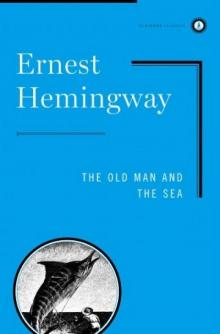 The Old Man and the Sea
The Old Man and the Sea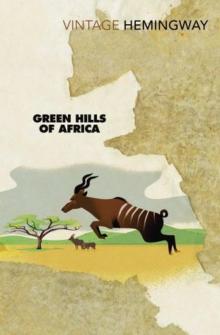 Green Hills of Africa
Green Hills of Africa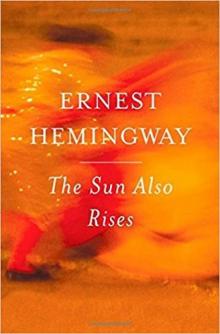 The Sun Also Rises
The Sun Also Rises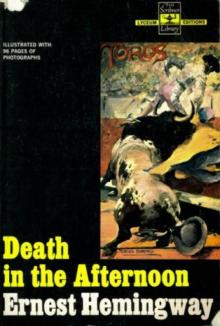 Death in the Afternoon
Death in the Afternoon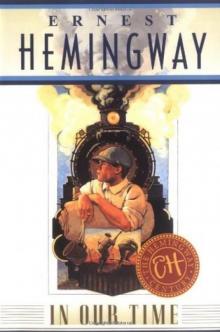 In Our Time
In Our Time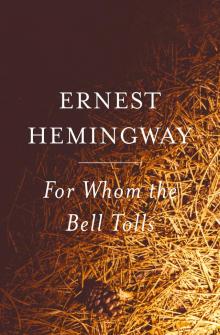 For Whom the Bell Tolls
For Whom the Bell Tolls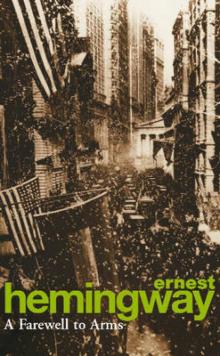 A Farewell to Arms
A Farewell to Arms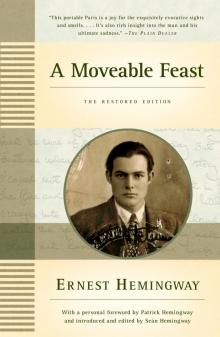 A Moveable Feast
A Moveable Feast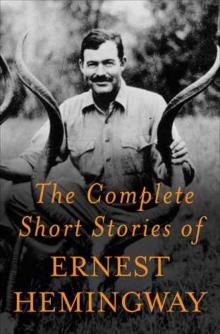 The Complete Short Stories of Ernest Hemingway
The Complete Short Stories of Ernest Hemingway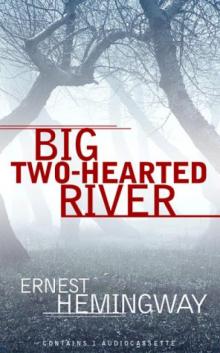 Big Two-Hearted River
Big Two-Hearted River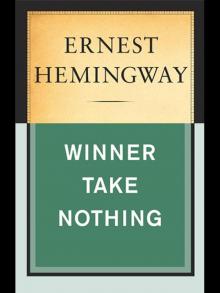 Winner Take Nothing
Winner Take Nothing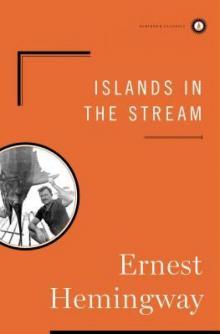 Islands in the Stream
Islands in the Stream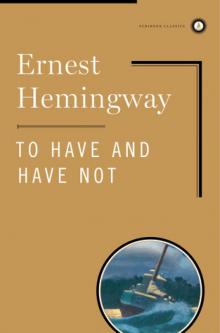 To Have and Have Not
To Have and Have Not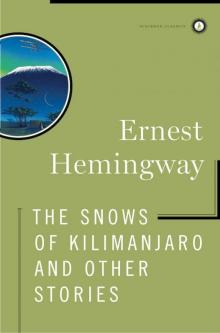 The Snows of Kilimanjaro and Other Stories
The Snows of Kilimanjaro and Other Stories Across the River and Into the Trees
Across the River and Into the Trees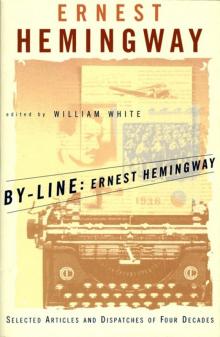 By-Line Ernest Hemingway
By-Line Ernest Hemingway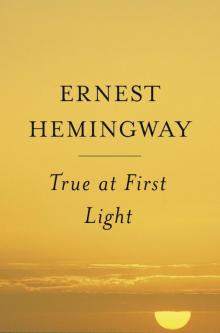 True at First Light
True at First Light Men Without Women
Men Without Women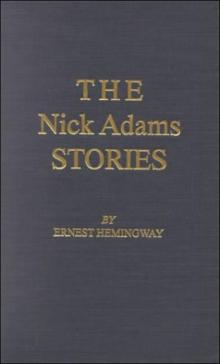 The Nick Adams Stories
The Nick Adams Stories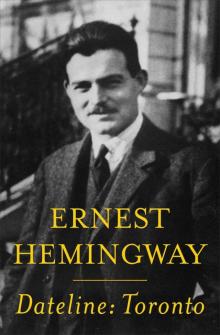 Dateline- Toronto
Dateline- Toronto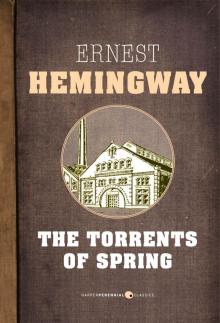 The Torrents of Spring
The Torrents of Spring Short Stories
Short Stories